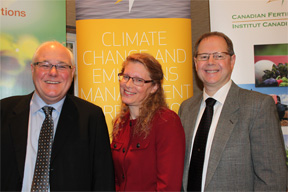Mentorship to empower African women in agribusiness
17 October 2024, Rome – The Food and Agriculture Organization of the United Nations (FAO) and…

It was my pleasure to be at the Grain Growers of Canada meeting this morning when the Climate Change and Emissions Management (CCEMC) Corporation announced it is providing $252,500 to support the second phase of a project led by the Canadian Fertilizer Institute (CFI) called Farming 4R Land. The project will help Alberta farmers improve yields, reduce greenhouse gas emissions linked to fertilizer use and generate offset credits. This project is funded through the Biological Greenhouse Gas Management Program that is delivered on behalf of the CCEMC by Alberta Innovates Bio Solutions.
Farming 4R Land Phase II supports implementation of Alberta’s Nitrous Oxide Emission Reduction Protocol (NERP), which enables farmers to qualify for carbon offsets within the Alberta offset protocol system. The project encourages broader adoption of CFI best management practices called 4RNutrient Stewardship – using the Right source, at the Right rate, at the Right time, and in the Right place®. In the process, farmers will reduce greenhouse gas emissions and with appropriate documentation, may generate offset credits as well. “Generally, if a farmer improves their best management practices when it comes to fertilizer use, our very conservative estimate is they can reduce their N2O (nitrous oxide) emissions by 15 to 25 percent,” said CFI Vice President of Strategy and Alliances, Clyde Graham. The project aims to have enough acreage qualified under Alberta’s Nitrous Oxide Emission Reduction Protocol to support offset transactions equal to 25,000 tonnes CO2e by the end of 2014.